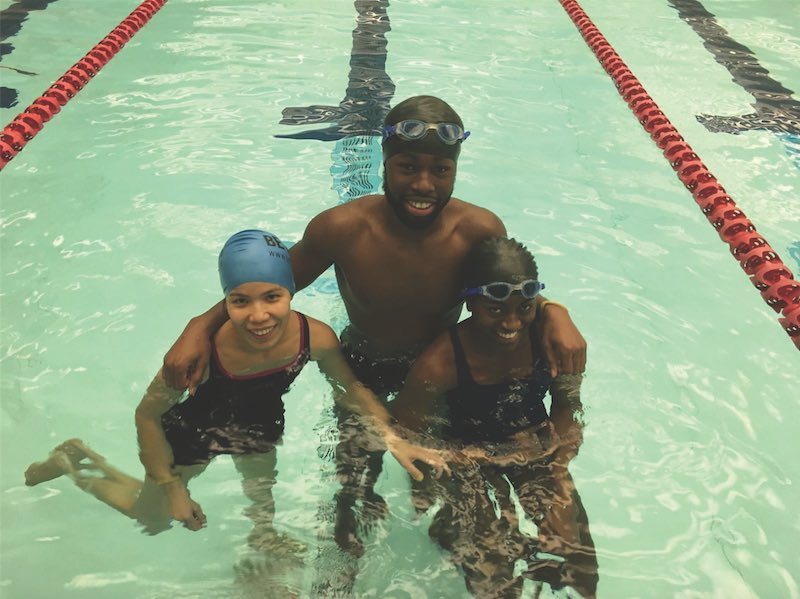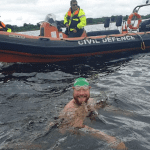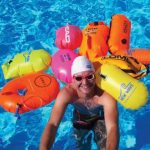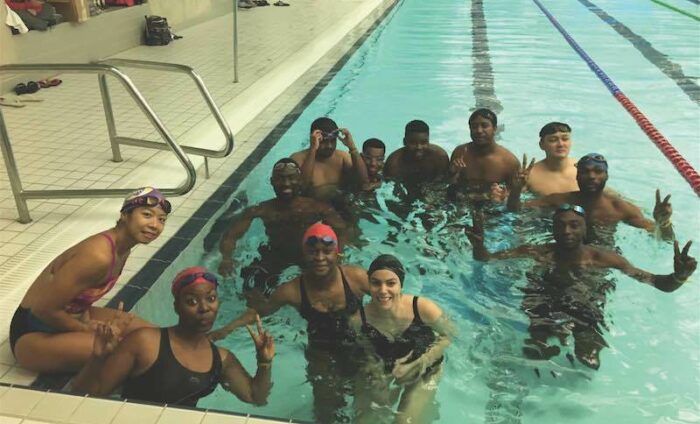
Swim London
According to the Amateur Swimming Association (ASA), 22% of women and 20% of men in England are unable to swim. Alice Gartland meets inspirational Swim London coach Harley Hicks, whose mission is to ‘rip those statistics apart’
Eighteen months ago Hicks was
asked by BBC TV presenter
and swimming world record
holder Ayo Akinwolere whether it would be possible to take a group of adults from being aquaphobic non-swimmers to completing their first mile in open water at the Great Manchester and Great London Swims.
“I don’t know” said Hicks, “Let’s try
it…”
From January to July 2015 Hicks
and his colleague Danielle Ballaram
ran weekly training sessions for
participants in the Swim Dem Crew
Swim Challenge, helping dissolve the
fear of water among participants
and leading to 12 completing
Great Swim events, including
one swimmer who went from
only being able to stand up in
the 0.8m deep children’s pool,
to completing a mile in Salford
Quays.
Alongside the formal tuition
provided by Hicks, Swim Dem
Crew, a community of swimmers
focused on participation and trying to
encourage those who don’t normally
swim to get into the water, provided
the social side and mentoring for the
project.
The Swim Dem Swim Challenge was well documented on social media, connecting with, and inspiring, a new audience for outdoor swimming and breaking through traditional parameters of a swimming club to create a swimming community.
“On the back of that, Swim London was created to target
adults who don’t have swimming as part of their family ritual, would like to learn to swim but have not had the chance to, or who’ve had a go in the past and it’s not worked out for whatever reason,” says Hicks.
The absence of the word ‘club’ is deliberate. “If it was a club, people would think they have to be able to swim to join, but this way people know that they can participate at any point.”
Swim London
Harley Hicks began his working life as an apprentice lifeguard with GLL in
2009 and designs and leads the project.
In summer 2016, Swim London got 225
people who didn’t swim participating
in 12-week learn to swim courses,
across six different centres in London –
Greenwich, Hackney, Waltham Forest,
Newham, Tower Hamlets, and the
Olympic Park.
The programme was funded by
Sport England and the GLA (Greater
London Authority) from community
engagement funding coming out of the
European Championships, held at the
London Aquatics Centre in May 2016,
and the courses culminated in a team
relay hosted by the London Aquatics
Centre in the Olympic pool, with
participants from each of the centres
competing against one another.
On the first course, the team relay
event was held during the London 2016
European Aquatics Championships – where the pool was set up in full
official competition mode, in front of a
crowd of family and friends.
Not only did the project teach 225
adults to swim, but 16 of those are now
qualified swimming teachers and will
be helping Harley to teach the next
batch of adult swimmers in 2017, and
introducing them to open water.
It’s a fantastic collective swimming
journey and in 2016 Hicks was the
ASA’s Swim Teacher of the Year for his
work with young adults from non-
traditional swimming backgrounds.
Inspiration
The course begins not in the pool, but
in the classroom, so that everyone can
share their experiences of swimming
in the past and the reasons behind
not being able to swim. As Hicks
describes, it’s “often because of negative
learning experiences as a child – being
introduced to swimming with a ‘just
throw them in’ approach and learn to swim environments that were very individual rather than social.”
Once in the pool, the first milestone is to be able to swim 25m with good technique, so that people are swimming efficiently. “It’s easier to build up stamina from that point,” says Hicks, and organised social events help build the supportive community both in and out of the pool.
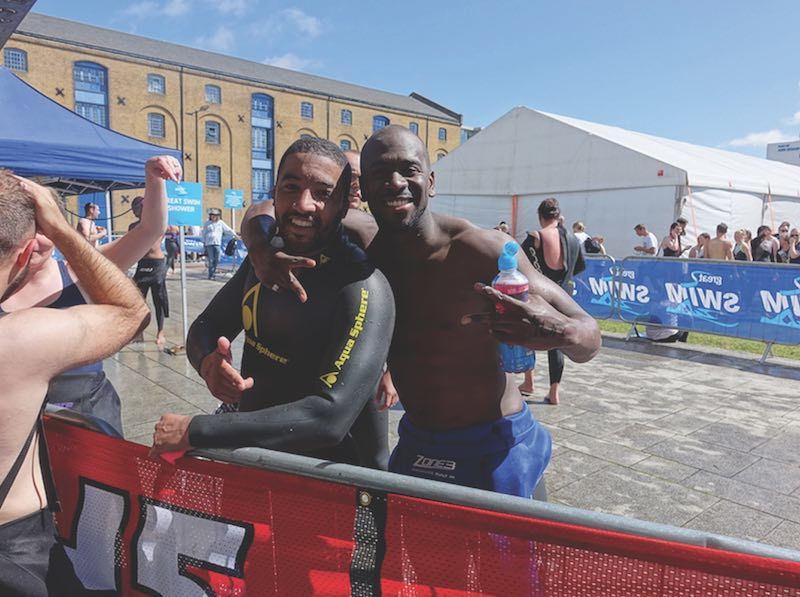
Transition to open water
The opportunity to try open water as
part of the course is introduced later
on, when swimmers have built up
their confidence. Swimmers try out
wetsuits and practise open water skills
like treading water before heading to
Hackney Reservoir.
Participants start by building up
to 80m swims from one pontoon to
another, and then venture out to the
full circuit.
As Hicks explains: “The contrast
with the pool can be really challenging.
The murkiness of the water can be very
unsettling and can impact on breathing
– those are the two things people
struggle with the most.”
Legacy
By supporting participants to go on to
train as swim teachers, the programme
is not only helping to change statistics,
but also creating a legacy that helps
ensure the lasting impact of London
2012, the Aquatics Centre and
beyond…
“My only limitation is fear” – CANDY HOANG, 39, SWIM WALTHAM FOREST
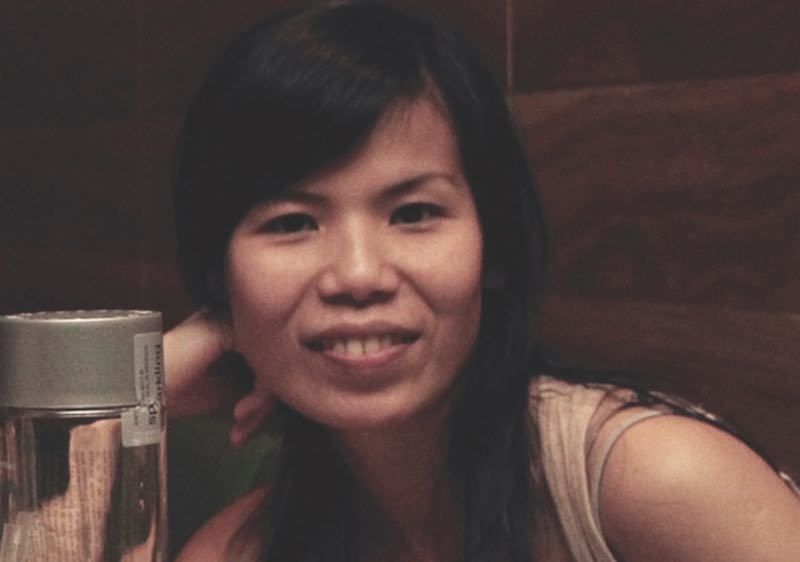
How did you hear about Swim
London?
My younger sister introduced me to
the programme.
What motivated you to take part
in Swim London?
My 19-month-old little girl; I want to be there for my daughter, so that she can have fun and feel safe in the water.
What was your experience of
swimming before participating in
Swim London?
Twice in my life I have almost drowned. I have always had to use swimming aids and was previously too scared to swim in the deep end.
What did you learn on the Swim
London course?
I realised that my only limitation is
fear. Taking part in the programme
took me out of my comfort zone
and now I really enjoy being in the
water.
How is Swim London different
to your previous experiences of
swimming lessons?
I’d had some very basic instruction
from friends, but never thought of
taking swimming lessons until now.
There were a lot of times when I
was doubtful of my ability, but with
the guidance and encouragement
of the instructors and other
participants, I learnt to believe in
myself.
What were the highs and what
were the lows during the course?
The low was my initial doubt in my
ability. Participating in the relay and my team (unexpectedly) winning was the real high point.
Please tell us about the relay
swim at the end of the course?
What did it mean to you?
Taking part in the relay was
tremendous fun and a test of my
abilities; winning was a bonus! I have
never won any medals or trophies in
my life and 2016 was my best year
for such achievements by far.
What impact has the Swim London
course had on your life?
I had felt I’d lost my direction in
life and all I could think about was
my little girl. However, because of her I was motivated to learn to swim and now I want to train as a teacher, so that I can help her to be safe in the water. Swim London and particularly the positive energy of my fellow participants has allowed me to find myself again.
Will you participate in open water
swimming in the summer and
why?
Absolutely! I went to Australia a
few years ago and fell in love with
surfing and diving, but because of
my limited swimming ability back
then, I never thought I’d be able to give it a go. Taking part in openwater swimming will help give me the confidence to realise that dream.
What are your swimming ambitions now?
I would like to continue improving my skills, and, more importantly, I want to contribute back to society, by passing my new-found skills onto others through teaching.
“There was no fear, just fun” – RENAY RICHARDSON, 32, SWIM HACKNEY

How did you hear about Swim
London?
My housemate took part in the first
Swim Hackney group and highly
recommended it to me.
What motivated you to take part in
Swim London?
I’ve wanted to learn to swim for
years, but every time I tried to find a course, they were full. This was a chance for me to really get involved.
What was your experience of
swimming before participating in
Swim London?
I couldn’t really swim. I never went to
swimming pools in London.
What did you learn on the Swim
London course?
I learned how to swim! We learned
great technique and I feel like I swim
like a pro now! The goal of my course
was to swim 25m and by the end of
the 12 weeks I was able to swim 50m.
How is Swim London different
to your previous experiences of
swimming lessons?
There is a social side to Swim
London that I don’t think you get
from other courses. It was a very
supportive environment. The
instructors were with us in the water.
Having them there at your own level
is really important, particularly at the
beginning, when you feel like you’re
about to sink every couple of strokes.
What were the highs and what
were the lows during the course?
The big high for me was when my
breathing technique for front crawl
finally clicked. My low was not being
able to do breast stroke. I just find it
really hard – although some people say it’s the easiest of the strokes!
Please tell us about the relay swim
at the end of the course.
I took part in the final relay that
was held during the European
Championships. It was in the
Olympic pool and we were treated
like pros. There was no fear, just fun.
Not many people can say they’ve
taken part in an event like that, when
12 weeks before they couldn’t swim!
What impact has the Swim London
course had on your life?
I swim a mile three to four times a
week now. Sometimes when I swim
I think wow, can you believe just
months ago you couldn’t do this! It’s a way to keep fit, but also fun, so not like the gym. I’ve also made some great friends and done things like swimming in the Thames which is just not something I ever thought was possible – I don’t think there’s another course like it!
Did you participate in open
water swimming as a result of
the course? If so, what was the
progression like from pool to open
water?
Yes, and pool and open water are
so different! I find swimming in
a wetsuit quite restrictive even
though it helps you float, so I chose
to do the Great Newham Swim
backstroke, which isn’t the usual
choice.
What advice do you have for
swimmers new to open water?
I’d say, don’t be afraid of not being
able to touch the floor as you forget
about that once you are in the water.
Use your favourite stroke and have
someone you trust swim with you.
Transition from pool to water: Hicks’s top tips
- Work on technique over small distances and look to
improve your stamina separately. Building stamina
with poor technique can be detrimental to your
overall stroke.
- Work on sighting in the pool before you attempt your
first open water swim. Effective sighting will keep
you on track and stop you from swimming double the
distance.
- Keep your wetsuit lubricated by allowing water in
through the chest at the start of your swim.
- Don’t panic at any point during the swim, the key to
long distance swimming is to relax and find a rhythm.
- Make sure you can swim 125% of your race distance
in the pool before race day!
